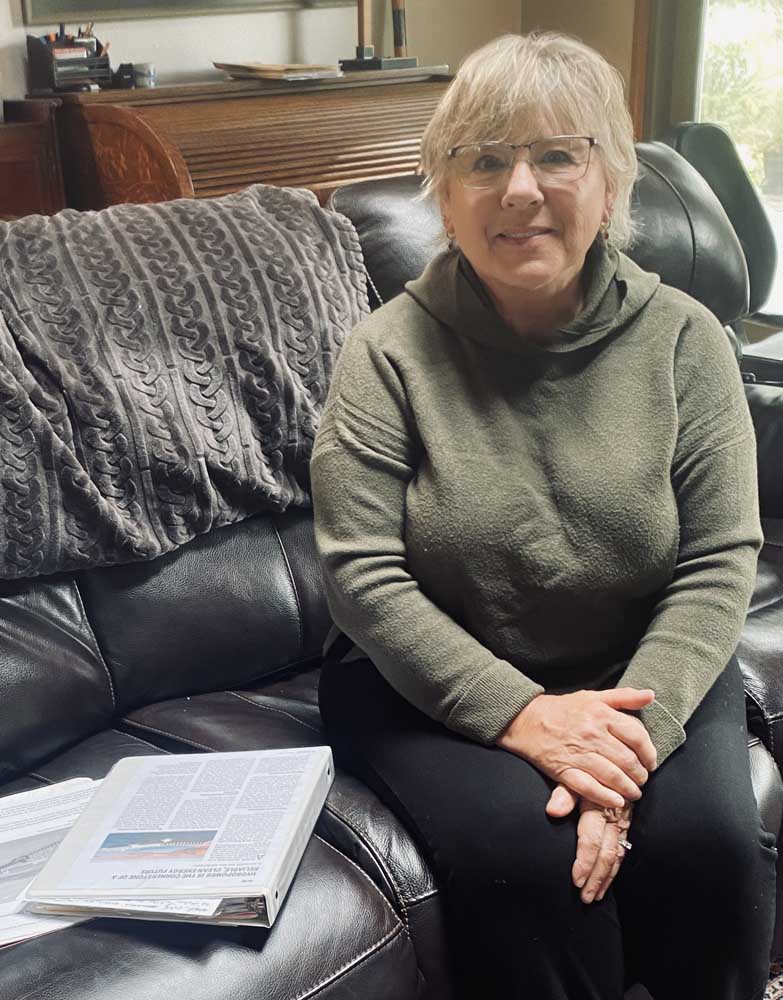Coast Chronicles: An energetic conversation with Debbie Oakes
Published 8:21 am Monday, October 28, 2024

- Debbie Oakes is running for her second six-year term as PUD commissioner for District #2, the Peninsula north of Pioneer Road.
Last weekend I met up with Debbie Oakes at her home mid-Peninsula where she and her husband John have lived since 1977. They’ve raised their kids here and the grandkids are growing up here as well. John is in fisheries; the family grows cranberries and distills delicious juices. (I can personally attest to that.) Daughter Tiffany and son-in-law Brady are owners of Adrift Hospitality. They are local to the core.
After six years as our north-end PUD commissioner, Debbie is being challenged in this election cycle. So I wanted to check in with her and get her take on our local energy issues. It’s a complicated subject. We spent two hours talking and barely scratched the surface of the energy field. Here are some highlights from our conversation.
Our energy future
It’s no surprise to anyone that energy demands will continue to increase in the future. AI and crypto currency consume huge energy resources. Plus, every new appliance or device we seem to need (not!) also must suck from the grid to keep itself alive. As climate change rolls along leaving a path of destruction in its wake, hotter and colder spells will also increase, requiring air conditioning or heating for longer and longer periods of time. Unfortunately, power blackouts in North Carolina, Texas, or in our own Okanagan a couple years ago may be more frequent occurrences.
We may think we’re insulated from these developments because we live in a small rural region, but think again. We are beholden to Bonneville Power Administration for all of our energy use. (This changed in 2023 when we went from “slice block”–purchasing 75 percent from BPA and the rest at market rates — to “load following” — now we buy 100 percent from BPA. Yes, it’s complicated.) So whatever happens to the big producers affects us.
Not only that but it seems to me the Peninsula is now “on the map” for both reasonably-priced real estate (though perhaps not for much longer) and as a known destination for “climate refugees.” And more residents — even seasonal ones — require more of everything, including energy.
We’ve been extremely lucky as Pacific Northwest residents to have hydroelectric subsidizing our energy costs. As David McClain (running against Debbie for PUD commissioner) says in his Aug. 15, 2024 Chinook Observer letter to the editor: “The average cost of residential power on the EastCoast is 30 cents per kilowatt hour (kwh). In California the cost is 35 cents/kwh. In Washington state the average is 12 cents/kwh; and in Pacific County, PUD residential rates are 6.34 cents/kwh.” We’ve been shielded from the true cost of energy by virtue of our Mighty Columbia and all its watershed energy-producing dams.
Although alternative energy — wind and solar primarily — and other new sources in-development are increasing, the growing demand versus the pace of getting green sources up and running is way out of whack. Even if green energy production was able to ratchet up sufficiently (which would take huge piles of capital that, so far, neither entrepreneurs nor government officials are willing to commit to), how do we get that power to where it is needed? Transmission line build-out and robust battery storage solutions are decades down the road.
Some insights
When Debbie joined the PUD, the board reflected the “good old boy” network so prevalent on the Peninsula in past years. Diana Thompson had busted into the club and when she stepped down she wanted to find a successor who could carry on the good work she’d started. Debbie stepped up and, she admits, it was hard going at first. “I had a lot to learn and initially my comments or questions were brushed aside. It took me two years or so to get my feet on the ground. Also the composition of the board changed over time. Now we have a strong and informed board of commissioners, able to discuss issues, gather information, and even if we don’t always have the same view point, we make our decisions by consensus.”
I might note that all three of our PUD commissioners are now women: along with Debbie, vice president for District #2; we have Pam Hickey, president, District #1; and Michelle Layman, secretary, District #3. (Their bios are online at www.pacificpud.org). I have to admit I never had occasion to even glance at the PUD website before interviewing Debbie; but when I took a look this weekend, I was surprised at the amount of information posted there. Though there are still some things missing: like why don’t we see the biographies and training of the various PUD staff serving us? And how and when can I get the much-vaunted cheap internet access?
The events page notes there is a surplus equipment auction happening this week. There are past meeting agendas; minutes, timelines, and other documents. Even so, there is perhaps not enough public information for those of us who just have a simple question — like (see above) where’s my cheap internet? (There is no designated public information officer in our PUD.) Or what is the policy on tree trimming? You might remember I raved about the chop-job enacted on the 100-plus-year-old tree on the corner of Sandridge and 267th just around the corner from me. (Why wasn’t the property owner made aware of the issue before the inexperienced trimming crew arrived?)
It’s not as if we all need to know the intricacies of energy supply, demand, policy, or legislation (though if you do, step on up!); but customer-facing issues, things that affect us in our day-to-day lives, might be a little better explained. Just a reminder, our PUD folks work for us; we pay the bills. Debbie understands that, “Our PUD was established to serve and enhance the public good and you are always welcome at our twice-a-month meetings. The first Tuesday of the month in Raymond our board meets at 1 p.m. in the PUD building; and the third Tuesday we’re at the PUD office in Long Beach. The community is always welcome to make comments, ask questions or just introduce yourselves. There are two times during the meeting — at the beginning and the end — when you can talk about anything you want.”
Snake River dams?
In our two hours together Debbie and I waded into some controversial territory. As an environmentalist, I’ve always supported the removal of the Snake River dams. I want to see that stretch of river opened up to salmon runs again before it’s too late. In talking to Debbie, I understand that the issue is not as simple as that.
The four dams on the Lower Snake River — Ice Harbor, Lower Monumental, Little Goose, and Lower Granite — produce between 933-1,000 megawatts of power annually, enough to power about 800 homes for a year. How would that power be replaced? And what would the effect be on agriculture, flood control, or slack-water transportation if the dams came down?
I began to understand that nothing is easy when it comes to energy policy: there are always tradeoffs, multiple stakeholders, consequences to be balanced, and a lot of information to examine before policy can be created or changed. I’ve noticed that McClain has made some good points in his various communications in the newspaper, though since his candidacy application he has not been to one PUD meeting.
Who do we want making these important decisions for us? As Debbie says, “The next six years will be a critical time for setting the future of our energy use and policy in Pacific County.” My choice is a local who knows the terrain, who’s lived in our community for 50-plus years; someone who’s put in the time to understand our energy challenges and the framework of both opportunities and constraints. In my opinion, that’s Debbie Oakes.









